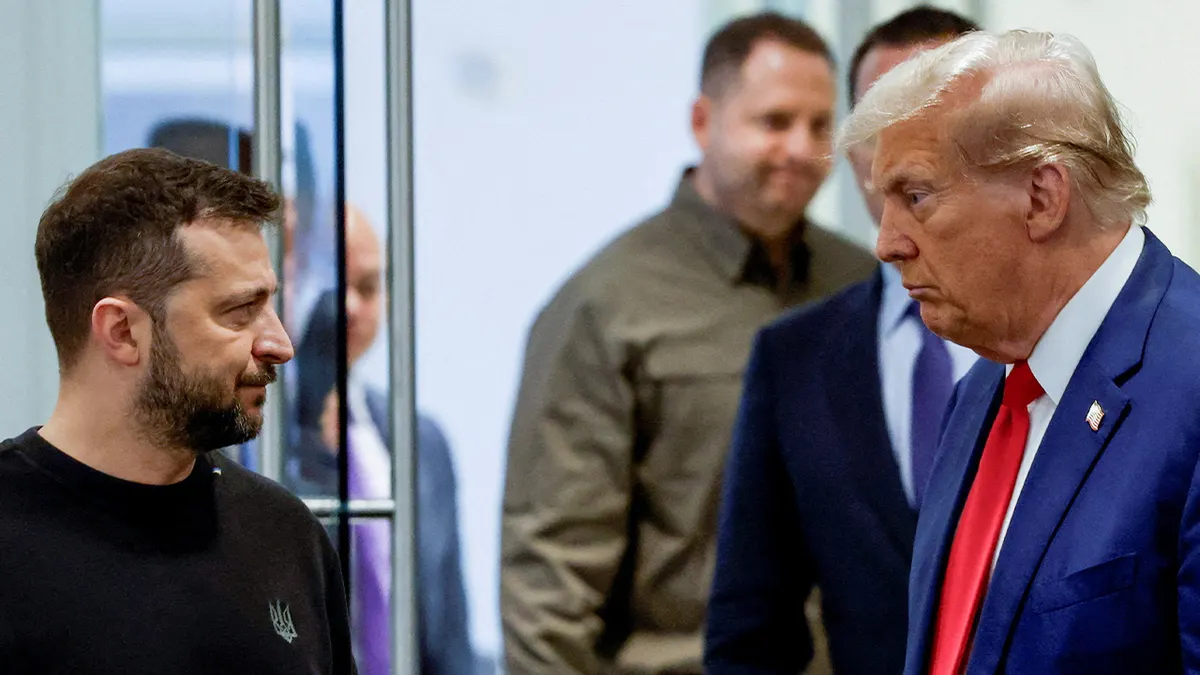In one of the most startling twists in modern diplomacy, Ukrainian President Volodymyr Zelenskyy has publicly stated that he would nominate Donald J. Trump for the Nobel Peace Prize—but only if the former U.S. president manages to broker a lasting ceasefire between Ukraine and Russia. It is the kind of statement that ripples instantly through headlines, boardrooms, and intelligence briefings alike. A peace prize for Trump? The idea seems almost absurd, almost theatrical—and that is precisely the point.
This wasn’t a slip of the tongue, nor an empty gesture. Zelenskyy’s choice of words reveals a rare and deliberate strategy: to turn Trump’s most defining trait—his appetite for attention and validation—into an instrument of statecraft. At a moment when the war grinds toward exhaustion, and global support for Ukraine shows signs of fatigue, the Ukrainian president may have found a way to keep the conversation alive by appealing to the one man whose desire for glory may yet prove useful.
The statement has already become a diplomatic Rorschach test. To some, it’s a shrewd calculation, a way to draw Trump into constructive engagement without conceding power. To others, it’s a sign of desperation, proof that even Ukraine’s famously resilient leader is running out of conventional levers to pull. Yet underneath the spectacle lies something more profound—a story of two leaders who understand performance as power, and how, in the theater of politics, flattery can sometimes be as potent as force.
A War in Stalemate and a President Running Out of Time
More than three years into Russia’s full-scale invasion, the war in Ukraine has entered a grinding stalemate. The early drama of David versus Goliath has given way to fatigue. Western funding is sputtering, European unity is strained, and even American voters—once passionately supportive—are growing weary of endless aid packages.
Inside Ukraine, Zelenskyy faces the most precarious balancing act of his presidency. He must maintain morale at home, sustain international attention abroad, and still appear confident even as victory drifts further from reach. Every speech, every trip, every photograph is part of that delicate orchestration. He knows that if Ukraine’s story fades from the world’s stage, its future will too.
In that context, his comment about Trump wasn’t an accident. It was a calculated act of narrative control. For months, Trump has claimed he could end the war “in 24 hours” if reelected—an assertion dismissed by most experts but believed by his base. Zelenskyy, recognizing that claim’s viral power, turned it into bait. By offering Trump a path to Nobel glory, he effectively called his bluff: prove it.
The Theater of Ego: Flattery as Strategy
Zelenskyy’s background as a performer often colors the way his critics talk about him—but it also explains his strength. Before becoming a wartime president, he was an actor, a writer, a man who understood how to use language, lighting, and tone to command emotion. When he addresses Congress, the European Parliament, or the United Nations, he doesn’t just give speeches—he stages moments.
And in Trump, he faces another master of performance. Trump’s political persona is built on image, impulse, and self-importance. He is drawn to the spotlight the way a plant bends toward sunlight. By promising him the world’s most prestigious symbol of peace, Zelenskyy has reframed the battlefield—not in terms of tanks or trenches, but of pride.
Trump, who has long accused his rivals of weakness and global institutions of bias, suddenly finds himself flattered by the very man at the center of one of the century’s most consequential conflicts. The invitation carries dual weight: it’s praise, and it’s provocation. To win that prize, Trump would have to deliver something tangible—a ceasefire credible enough to stop the bloodshed, even temporarily.
And if he fails? The responsibility remains his. Zelenskyy loses nothing. Trump loses face. Either outcome keeps Ukraine in control of the narrative.
The Psychology Behind the Play
Every effective piece of diplomacy relies on understanding human nature. Zelenskyy’s offer was not born in a vacuum—it was informed by how Trump operates. Trump responds to challenges wrapped in admiration, not confrontation. He has always sought to be the dealmaker, the man who steps into chaos and emerges triumphant.
By couching the proposition in praise—by saying, essentially, “I believe you could achieve peace when others have failed”—Zelenskyy flips the script. He isn’t begging for help; he’s flattering Trump into proving his boasts. It’s psychological judo, using Trump’s forward momentum against him.
For Zelenskyy, this tactic serves another purpose. It makes him appear diplomatic rather than desperate. He is not scolding America for wavering support; he is offering a challenge to its most unpredictable power broker. It reframes weakness as cunning, fatigue as strategy.
Behind closed doors, diplomats and intelligence analysts likely recognize this for what it is—a layered maneuver, designed to plant a seed in Trump’s mind that peace in Ukraine could be his legacy, his brand, his redemption arc. Few incentives could be more powerful.
Between Two Realities: Desperation and Genius
Of course, not everyone buys into this interpretation. Critics, particularly in Europe, have called the move reckless. “You don’t dangle Nobel prizes before men like Trump,” one commentator said. “You feed the beast.” They argue that legitimizing Trump’s narrative could weaken the current administration’s support for Ukraine, or worse, embolden Russia to stall until a friendlier White House arrives.
Yet others see genius in the chaos. “Zelenskyy is playing the long game,” says a former diplomat. “He’s not trying to win Trump’s friendship; he’s trying to control his vanity.”
Indeed, Ukraine has long mastered the art of asymmetric diplomacy—leveraging soft power where hard power is scarce. From viral speeches to viral symbolism, Zelenskyy has used narrative as a weapon from the war’s first day. The Nobel comment fits neatly into that arsenal. It’s audacious, polarizing, but unmistakably effective. The world is talking about Ukraine again.
The Election Factor: America as a Battleground
There’s also timing to consider. With the U.S. election approaching, Trump’s reemergence as a potential foreign policy actor is unavoidable. His campaign thrives on spectacle, grievance, and the promise of decisive deals. Zelenskyy knows this. He also knows that a divided America could leave Ukraine stranded in the fog of domestic politics.
By invoking Trump’s name in connection with peace rather than conflict, Zelenskyy cleverly shifts the narrative. He’s not attacking Trumpism; he’s harnessing it. He’s implying that even the most disruptive force in American politics could, under the right conditions, serve Ukraine’s survival.
This positioning also places pressure on the current administration. If Biden’s team is seen as stagnant on diplomatic breakthroughs, Trump’s boasts of “ending the war in a day” may start to sound less fantastical to weary voters. Zelenskyy is effectively playing both sides—appealing to Biden for continued support while subtly signaling to Trump that he too can be part of Ukraine’s salvation story.
It’s the rare act of political multitasking: appease the present, court the future.
The Optics Abroad: Moscow, Beijing, and Beyond
Predictably, Moscow has mocked the announcement. Kremlin officials dismissed it as “performative desperation,” claiming Zelenskyy is now auditioning foreign leaders instead of leading his own army. Yet even that mockery betrays discomfort. The idea of Trump—the unpredictable, deal-obsessed former U.S. president—suddenly reentering the diplomatic fray is not something Russia necessarily wants.
Beijing, meanwhile, is watching closely. China’s efforts to position itself as a neutral peace broker have been complicated by its ties to Moscow. If Trump were to claim the peace mantle, Beijing’s own narrative as mediator-in-chief would be undermined. Zelenskyy’s words, therefore, have reached far beyond Washington—they have unsettled the balance of diplomatic posturing worldwide.
And in Europe, leaders torn between compassion fatigue and geopolitical anxiety are reminded that Ukraine still knows how to command attention. The statement forces allies to pick sides—not between war and peace, but between cynicism and hope.
The Power of Symbolism in a World of Fatigue
Diplomacy, at its core, is theater with real consequences. Zelenskyy, more than most, understands this. He has stood before parliaments wearing olive drab instead of suits, spoken through translators yet commanded moral clarity, and transformed global sympathy into ammunition.
Now, with his Nobel remark, he has once again captured attention—not through shock value alone, but through irony. By dangling the promise of the world’s highest honor for peace to one of its most polarizing figures, he has forced the world to imagine an impossible scenario: Trump, peacemaker. It’s absurd enough to provoke curiosity—and that curiosity keeps Ukraine’s war in the headlines.
The act also mirrors Zelenskyy’s core method of survival: never let the story die. When the tanks stop moving and the cameras drift away, narrative becomes the last weapon left. By keeping even the improbable alive, Zelenskyy ensures Ukraine remains impossible to ignore.
The Deeper Game: Legacy and Leverage
Zelenskyy knows he is not just fighting for territory—he is fighting for historical memory. Every decision he makes now will shape how the world remembers this war. Was he the leader who begged and failed, or the strategist who maneuvered until the end?
The Nobel play fits into that pursuit of legacy. It casts him as a diplomat unafraid of unconventional means, a man willing to flatter if it serves survival, to provoke if it sustains attention, to weaponize irony if it keeps Ukraine in focus.
Even if nothing tangible comes from the offer, it reinforces Zelenskyy’s image as adaptive and unpredictable. He doesn’t just play defense on the battlefield—he plays offense in diplomacy.
And for Trump? The seed has been planted. Every future statement about “ending the war” will now carry the shadow of Nobel ambition, even if unspoken.
The World Reacts: Shock, Cynicism, and Secret Admiration
In European capitals, diplomats quietly admit admiration for the move. “He’s outmaneuvering everyone,” said one insider. “While others are tired, he’s still making headlines.”
In Washington, the reactions are more complicated. Biden officials have downplayed the comment, calling it “symbolic.” Yet even they know Zelenskyy has positioned himself cleverly. If Trump returns to power, Ukraine can claim it was the first to welcome him as a potential peacemaker. If he doesn’t, Ukraine loses nothing—and retains moral high ground for having sought peace by any means.
Among analysts, the tone ranges from disbelief to begrudging respect. Some call it a “high-wire act between genius and insanity.” Others see it as a reminder that in modern politics, perception is power.
The Curtain Call: When Flattery Becomes a Weapon
Whether the world views it as theater or diplomacy, Zelenskyy’s gesture has done something remarkable—it has made peace a headline again. For months, news about the war has focused on attrition, artillery, and exhaustion. Now, the conversation has shifted back to negotiation, possibility, and intrigue.
And that is the essence of the move. By flattering Trump, Zelenskyy has re-injected drama into a war the world was starting to tune out. He has forced his enemies, allies, and even skeptics to talk once more about Ukraine’s future—not its failure.
Perhaps that is the real genius of it. The Nobel comment may never lead to a peace prize, but it has already achieved something rarer: relevance. It has reminded the world that even amid fatigue, a well-timed line can pierce the noise of history.
Zelenskyy knows his words are not magic—but in a war where silence equals defeat, words may be the only weapon he has left.
And if those words just happen to stroke the ego of the world’s most unpredictable showman? Then maybe that’s not weakness at all. Maybe that’s survival dressed as strategy.

